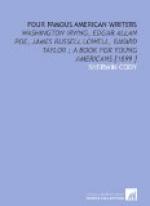CHAPTER X
POE AS A STORY-WRITER
Next to “The Raven,” Poe’s most famous work is that fascinating story, “The Gold-Bug,” perhaps the best detective story that was ever written, for it is based on logical principles which are instructive as well as interesting. Poe’s powerful mind was always analyzing and inventing. It is these inventions and discoveries of his which make him famous.
The story of the gold-bug is that of a man who finds a piece of parchment on which is a secret writing telling where Captain Kidd hid his treasure off the coast of South Carolina. The gold-beetle has nothing whatever to do with the real story, and is only introduced to mystify. It is one of the principles of all conjuring tricks to have something to divert the attention. Poe’s detective story is a sort of conjuring trick, but it is all the more interesting because he fully explains it.
Cryptographs are systems of secret writing. The letter e is represented by some strange character, perhaps the figure 8. In “The Gold-Bug” t is a semicolon and h is 4, so that; 48 means the. Sometimes the letter e is represented by several signs, any one of which the writer may use; and perhaps the word the, which occurs so often, is represented by a single character, like x. Often, too, the words are run together, so that at first sight you cannot tell where one word begins and another ends.
Solving a cryptograph is like doing a mathematical problem, and Poe was very clever at it.
He published a series of articles on “Cryptography” or systems of secret writing, in Alexander’s Weekly Messenger, and challenged any reader to send in a cipher which he could not translate into ordinary language. Hundreds were sent to him, and he solved them all, though it took up a great deal of his time.
In the same line with this was another feat of his. Dickens’s story, “Barnaby Rudge,” was coming out in parts from week to week, as a serial publication. From the first chapters Poe calculated what the outcome of the plot would be, and published it in the Saturday Evening Post. He guessed the story so accurately that Dickens was greatly surprised and asked him if he were the devil.
Again at a later date Poe wrote a remarkable story, “The Mystery of Marie Roget.” A young girl had been murdered in New York. The newspapers were full of accounts of the crime, but the police could get no clew to the murderers. In Poe’s story he wrote out exactly what happened on the night of the murder, and explained the whole thing, as if he were an expert detective. Afterward, by the confessions of two of the participants, it was proved that his solution of the mystery was almost exactly the truth.




